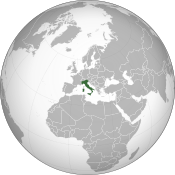Italian parliament votes to back same-sex civil unions
Thursday, May 12, 2016
Members of Parliament in Italy voted yesterday in support of the introduction of same-sex civil unions. The vote passed by 369 to 193 by Italy's lower house, the Chamber of Deputies. The upper house approved the bill in February.

Image: Official website of Ali Khamenei.
Prime Minister Matteo Renzi called for a vote of confidence in the government and a successful vote has passed approval on the bill automatically. Italy was the last major western country where same-sex relationships were legally unrecognized.
"Today is a day of celebration for so many people", Renzi wrote before the vote on his Facebook page. "We are writing another important page of the Italy we want [...] It was no longer acceptable to have any more delays after years of failed attempts."
The bill has been criticized for not going far enough to create equality for gay couples. Compared to some other European countries the bill does not stretch as far on such issues as adoption. A previous proposal calling for a pledge of loyalty, which would have made the unions more similar to marriage, was dropped. Despite this gay couples have more rights under the bill, such as the right to take a partner's name.
Organization Arcigay national secretary Gabriele Piazzoni said of the vote, "The glass is half-full. The text contains the recognition and protection many gays and lesbians have been waiting for all their lives [...] [but] everything this law has failed to guarantee leaves a bitter taste."
Religion was a factor in the passing of this vote as well as previous attempts. Italy is largely Roman Catholic. Speaking to newspaper la Repubblica, Archbishop Michele Pennisi said "There is a large part of the country that did not want this law passed." He also criticized that the vote was brought through using a confidence vote, a move he referred to as "creeping fascism".
Sources
- AFP. "Italian MPs support introduction of same-sex civil unions" — The Guardian, May 11, 2016
- "Italian MPs back same-sex unions in vote for Renzi" — BBC News Online, May 11, 2016
- Nick Squires. "Italian parliament gives gay unions the green light" — The Daily Telegraph (United Kingdom), May 11, 2016

